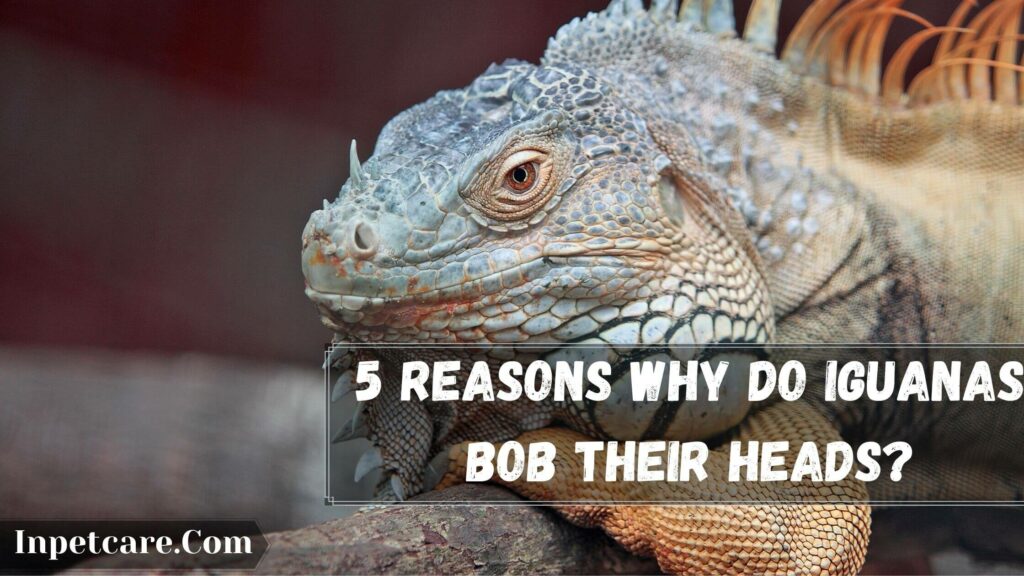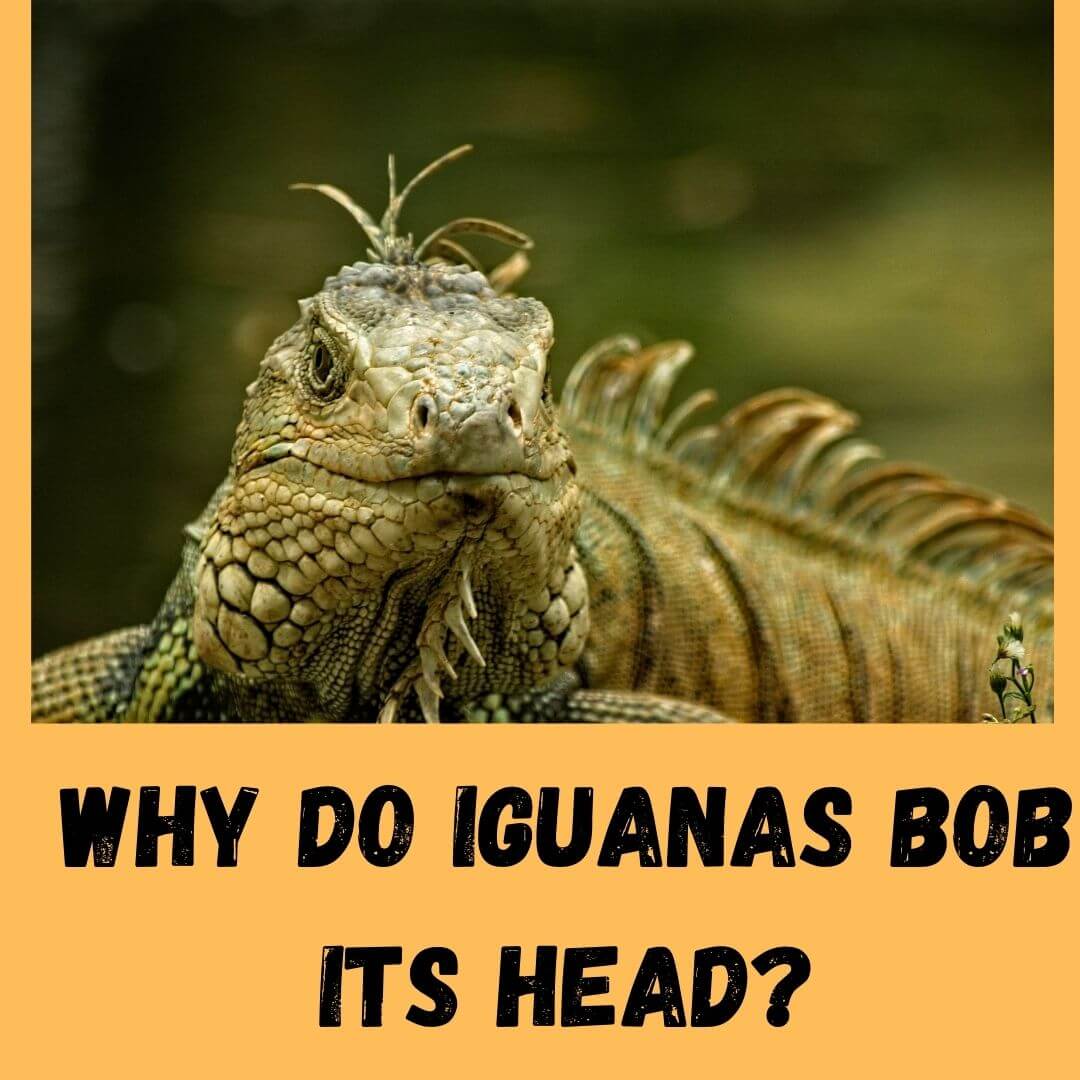A responsible pet owner can see their iguanas doing unusual behavior, whether in the wild or captivity. One such behavior that tends to concern most iguana owners is bobbing their heads up and down.
At first, this behavior may look like they are just nodding along to music that only they hear. But is this normal? This article will cover the main reasons why Iguanas bob their heads. Most times, it’s nothing to be worried about, but sometimes it can also be a sign of health issues like stress.
We will also discuss some of the Other common body language of Iguana and its meaning. For most lizards, head bobbing is a necessary form of communication. But is it proper for Iguana? Depending upon circumstances, Iguana Bob their heads during mating and courtship.
They also bob their head to scare off any Predator if there is. Sometimes, iguanas have been seen behaving when they want their owner to belly scratch them. First, let’s talk about five main reasons why iguanas Bob their heads up and down.
Post Contents
5 Reasons Why Do Iguanas Bob Their Heads?

Below I have mentioned the five most common reasons why iguanas Bob their heads up and down. There are lots of factors that contribute to this behavior. But mostly, Iguana tends to Bob its head Because of one of the reasons mentioned below.
Factors like environment or the presence of any other lizard around your iguanas can make them Bob their head. Without wasting another sec, let’s go over each of the reasons below.
1. To Mark Territory
Lizards like iguanas are highly territorial, and if they feel like that territory is threatened, they will Bob its head to scare off or dispel the other one. When an iguana is threatened due to the presence of another lizard, both its leaders show a dominant attitude and assert their control.
Head Bobby can always be a sign of dominance over one another, especially when you have more than one Iguana in the same tank. If you have kept two male iguanas in the same tank, they will often sense threat or conflict. It’s typical for male iguanas to Bob their heads at one another aggressively if they share the same space.
2. To Attract Mates
When there is any potential partner near your Iguana, it will Bob its head up and down to catch the attention of the females. They have been seen doing this behavior to signal their mate that they are available.
Bobbing its head makes male Iguana attractive to their fellow female lizards. Always remember that iguanas also do this out of frustration when there is no potential mate nearby, especially where they are having the feeling of being loved.
In the mating season, if you encounter your Iguana bobbing its head, it can be due to the absence of an appropriate mate. It can always be a sign of frustration in iguanas’ breeding season.
3. To Scare Off Predators
It’s common for Iguana to Bob, their head in front of predators. If an Iguana is threatened or scared, it will nod its head up and down. In this case, head bobbing can be a warning sign that they are ready to fight.
Adding to this, when iguanas Bob their head, they seem faster, bigger, and more agile. Thus making the Predator think twice before attacking that lizard. Head bobbing is not the only defense mechanism Iguana use to scare off the predators. Head bobbing often accompanies other defense mechanisms like displaying their dewlap or expanding neck frills.
4. To Seeking Your Attention
Iguanas that humans have raised are accustomed to the attention of their human companion. Most hand-raised Iguanas are often grown to like it. Therefore an Iguana may Bob its head to catch its owner’s attention.
If you are not giving enough playtime or petting iguanas, this is the time to rethink. When iguanas don’t get enough attention, they show uncommon behavior to catch their owner’s attention for a quick belly scratch.
5. To Form Communication
In lizards, head bobbing is often used to communicate beyond scaring off predators or mating. If your Iguana was captured directly from the wild, he/she might bob his head when looking for its community.
If there is more than one Iguana in the same tank, one of them may nod its head to get another’s attention or to signal the established social hierarchy in the enclosure. In the section of multiple Iguanas, the most dominant and the largest will often Bob head at others.
When Is Head Bobbing Concerning Or Unusual?

There are many natural reasons why an Iguana mein Bob its head, but sometimes it can also be a sign of concern. It can also mean something is quite not right with your Iguana. If your Iguana is Bobby, it’s a lot without any apparent reason.
It can be a sign of stress. If you notice your equine doing this behavior out of Noor, something changed. And Iguana usually feels pressure when there is any change in the environment. Any sudden change in their environment cause Iguana anxiety.
Another reason could be the presence of another pet in the room, like a cat or a dog. If a cat or a dog is nearby your enclosure, it might cause anxiety and stress. If there is no significant change in that environment or the introduction of another pet animal, then below are the reasons why your iguanas may be stressed out.
5 Signs Of Iguana’s Stress
- As iguanas can’t regulate their body temperature, you need to provide the ambient temperature to keep them comfortable and warm.
- Iguana love hiding by curling up or when they feel stressed. If you have not decorated your Iguana’s enclosure with the right equipment according to their needs, they can be highly stressed. Without appropriate hiding, iguanas are known to get anxious very quickly.
- If you are feeding the same thing to your Iguana every day, they may Bob its head to let you know it’s boring for them. If there is any nutritional deficiency, they may nod their head. All lizards and reptiles like iguanas need a varied diet.
- If your Iguana doesn’t receive the proper amount of UVB light, it won’t be able to produce Vitamin d3, which is needed to break down and absorb calcium. Without an appropriate light of UVB or sunlight exposure, the Iguana may feel sick, bobbing its head.
- If your Iguana is dehydrated or there is no water available, they constantly Bob its head to give you the notion that you need to provide them with water. Always provide proper access to freshwater to your iguanas daily. Depending upon the dirt it contains, you might also need to change its water from time to time to keep it fresh.
If any of the problems mentioned above are there, an Iguana may frequently bob its head, and it’s common for Iguanas to Bob their heads in anxiety. If you have checked all of these problems but still your Iguana seems to nod, take a trip to the vet. Professional veterinarians will help get more accurate causes at the pinpoint level.
Interesting Further Reading
FAQ
Conclusion
As iguanas can’t talk to humans in words, they often give signs through their behavior and body language. Iguanas are very expressive lizards when it comes to their body language. It’s common for iguanas to display a distinct body language to tell what is going on with them.
Behavior that isn’t of concern is how they express what they are feeling or going through. An Iguana may also Bobby its head if there is another lizard nearby. By now, you know why in my Iguanas bobbing its head.
Depending upon circumstances and health, they might Bob their head. It is a pervasive body language when in captivity with another companion. Learning your Iguana’s body language will help you discover their expressive anti-life full personalities making the bond stronger.
I hope I have given all the information about why iguanas Bob their heads. Any questions regarding this behavior can be asked in the comment section. If you like this article, consider sharing because it’s my turn-off to be helpful to anyone with their lizards like Iguana. Your one share may save someone’s beloved pet’s life.

94% of pet owners say their animal pal makes them smile more than once a day. In 2007, I realized that I was made for saving Animals. My father is a Vet, and I think every pet deserves one. I started this blog, “InPetCare”, in 2019 with my father to enlighten a wider audience.
